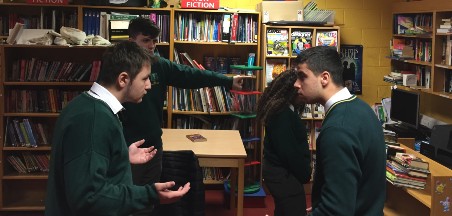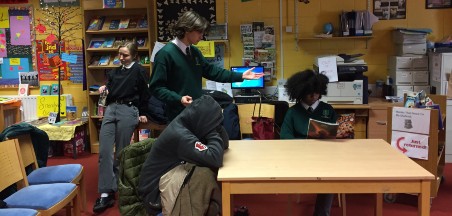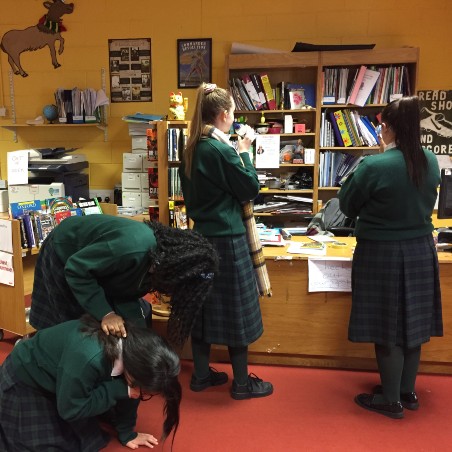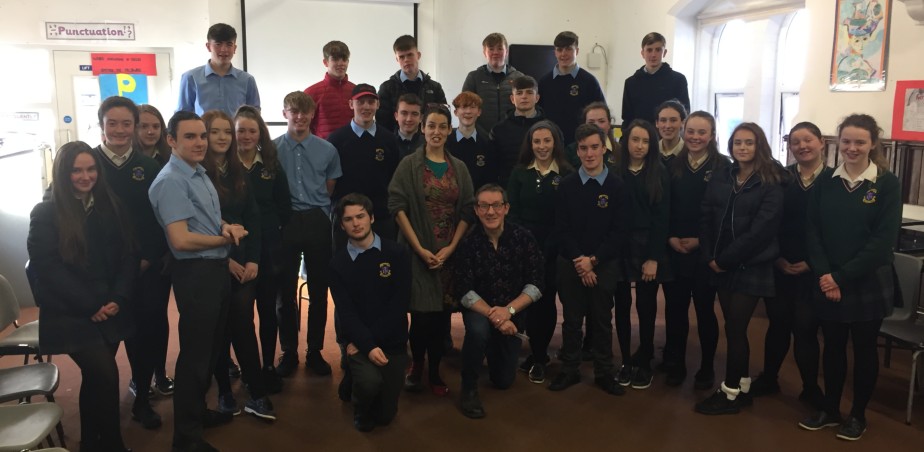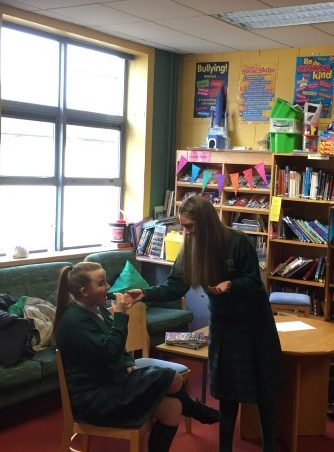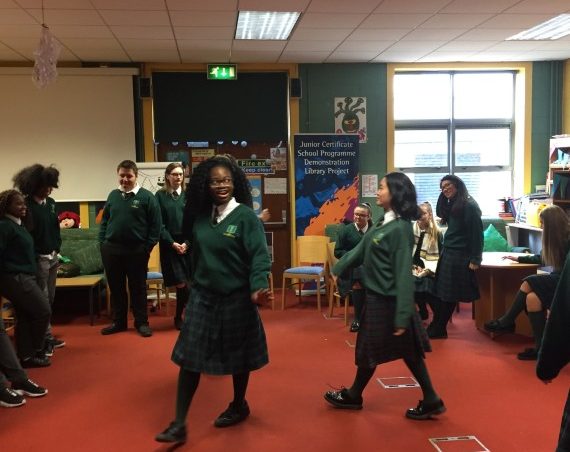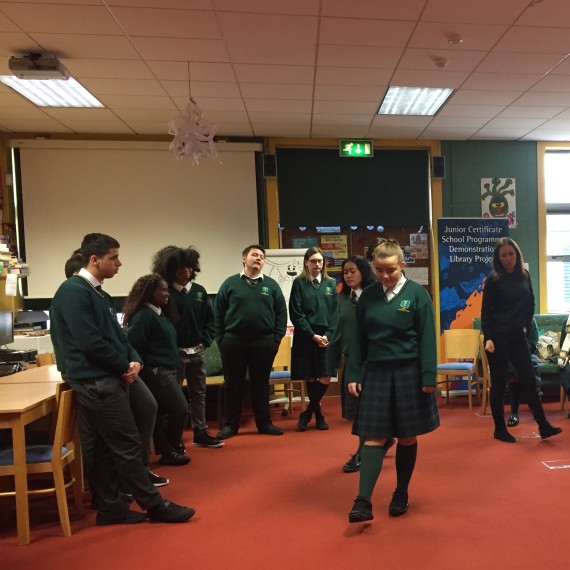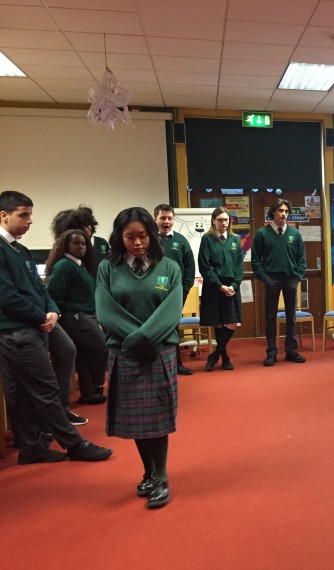Refine by Region
Refine by Art Form
Refine by School Level
‘Asking For It’
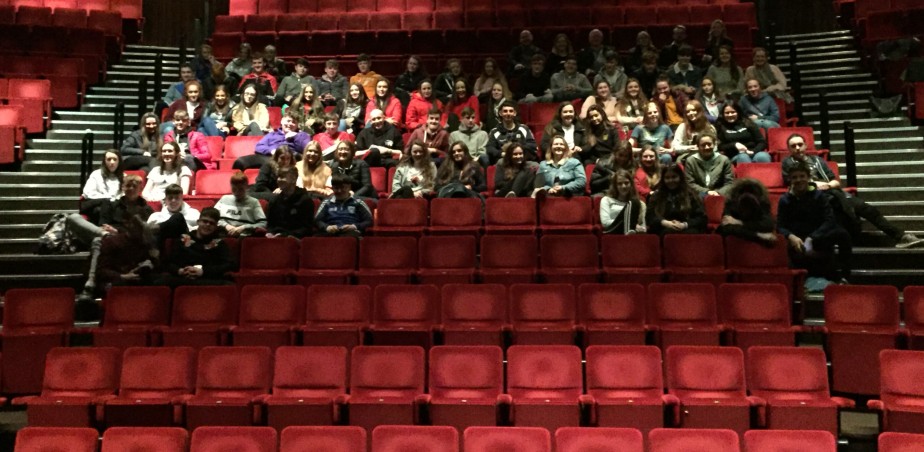
Image copyright: The Abbey Theatre
Tell us the story of your project – What was the impetus? What was it about? Who was involved? How did you begin?
In February 2018 Landmark Productions and Everyman Theatre Cork approached us to ask what ancillary activities would we be organizing around the production of ‘Asking For It’ they were planning to stage in June and which would subsequently transfer to the Abbey in November.
We all saw the necessity to involve young people in the story and so aside from the Abbey’s usual provision of post-show talks and podcasts we decided to take the work into schools as directly as possible. We planned a structure of pre and post show workshops to support any school who was going to see the play. We also committed to the creation of a teachers study pack which could appeal to many levels of ability.
After speaking about schools visits to Louise O’Neill, the author of the novel on which the play was based, it became clear that we needed specific training in dealing with this project. Louise’s disturbing experience had been that in nearly every school she had visited herself at least one young woman had disclosed she had experienced sexual assault.
On 24th July we hosted a workshop by Tender UK a theatre company that specializes in exploring issues of abuse with post primary students. On their advice we changed the original plan of having a sole female facilitator to having workshops run by both a male and female so they could model healthy gender relationships. That’s when I stopped just managing the project and stepped in as co-facilitator.
Based on her previous work with the Abbey we contacted actor and facilitator Aoibheann McCaul and she and I planned the post-show workshop together. Aoibheann also attended a training session at the Dublin Rape Crisis Centre.
How were the ideas developed and how did the young people, artist and teacher work together?
Aoibheann and Phil started visiting schools in October using applied drama to explore the students’ sense of the characters involved in the story and any links they had to students’ own sense of gender roles, friendship dynamics and sexual consent. These pre-show workshops were introductory and often didn’t go into the ethics of consent or even the plot of the play if the students’ weren’t already aware of the story. We wanted the students to experience it theatrically. For those that were aware of the book though, we found that for some the issues of assault were still unclear, “Well she took him into the room so she was asking for it, wasn’t she?”
The groups went to performances of ‘Asking For It’ at the Abbey Theatre and met a couple of the cast afterwards. The actors had all volunteered to talk to the students and were eager to engage with their responses. These ranged from the shy and practical (“How do learn your lines?”) to more in depth enquiries “How do you play someone so nasty?” “Why did you choose to do this particular play?” “What’s it like having to play Emma over and over again?”. One all-girl’s school which had been skeptical about assault changed their view completely and demanded their teachers give them better sex education in future especially about consent.
Aiobheann and Phil then returned do the schools for a two hour long post show workshop that built on the previously introduced techniques of statues, tableaux and walking in character to explore how both the characters and the students themselves had changed over the course of the evening.
As with the pre-show workshops we used a basic drama technique to encourage recollection of a lived moment e.g. “How did you feel at the interval of the play?” or “What moment do you remember most about the beginning of the show?” and then encouraged others to ‘read’ these and reflect upon them. The majority of the workshop was taken up with creating tableaux of the most striking moments of play and then exploring what could have been going through the characters minds at the time. This meant we could explore many of the themes of the work –gender dynamics, peer pressure, sexual consent, family tension – from inside realistic illustrations of how these manifest in behavior. Some highlights of this were the complex dynamics of single gender friendship groups, what was going through the minds of the young men while they were assaulting Emma, how Emma’s father uses emotional blackmail to reinforce her decision to drop the charges.
We also looked at how characters’ lives were changed by the events of the play and again found quite a range of responses from those who thought e.g. Zoe would be 1/ glad that she could now “Take over Emma’s place as top girl.” to “/ Zoe will be even more cowed by the knowledge her assailant, Dylan, has avoided prosecution for a second assault. It was in this section that the students really got to see the differences in their views.
There was quite a range of responses with the majority of students becoming more understanding and articulate about the circumstances that led to Emma’s choices and how she had been raped. Our touchstone was whether they saw Emma’s encounter with Paul at the party as consensual or not (Emma is plainly on drugs and asks him to wait which he ignores). Before the show this encounter separated out those who had considered the theme of consent in any depth from those who followed conventional option.
Generally the more depth of engagement with the story and characters resulted in a more sympathetic response to the play and more varied and satisfying discussion. One school was already putting on their own play about consent looking at an incident from different viewpoints and our work here became much more do do with teasing out the nuances of motivation in the subsidiary characters e.g. why the mother was drinking, or how the father was avoiding responsibility when asking Emma if she really wanted to drop the charges. We were surprised to find in another school they still felt Emma had been “asking for it” because she had taken drugs and therefore implicitly consented. In this school there was less empathy for the characters and many of them talked about Emma as ‘a girl like that would’ indicating the distance they felt to her. The work here was harder because the students seemed entrenched in their positions and surprised and resistance to being asked to question them.
The most dramatic changed came with one all girls school who in the pre-show had felt Emma had encouraged Paul. By the end of the show and in the post show workshops they were clear that the sexual double standards evident in society and the lack of appropriate sex education in the field of content were unacceptable.
At the time of writing this we have two more schools to visit. One, a private male only boarding school, will offer the most challenging work as some of the pupils were already defensive and dismissive of the whole premise of the story, believing it to be unrealistic and diverting the debate with arguments that some women lie, men get raped too etc….we were specifically asked to work here by an existing teacher because they felt attitudes towards women needed to be challenged.
For follow on work we created a Study Pack with an analysis of the play and its themes but also extra ancillary material on the history of consent in Ireland, plans of the pre and post show workshops, blogs by students form Cork who’d seen the original production and an example of a homegrown consent workshops. We also asked the pack’s main author, critic and activist Saoirse Anton, to contribute an essay on the connection between consumer culture and rape culture.
What was your personal experience of the project in terms of successes and challenges?
Phil Kingston, Community & Education Manager & Co-Facilitator
After speaking to Louise I had concerns about the work triggering traumatic experiences in the participants while remaining convinced it was essential young people be given a chance to engage with the issues directly; no amount of older generations talking about the topic of consent was going to make nearly as much difference as exploring it with their peers. I saw this clearly when attending a town hall meeting arranged by the Everyman Theatre and Land mark productions in Ballincollig where teacher Tim Burke arranged for his class to discuss the play with Louise O’Neil, Mary Crilly of the Cork Rape Crisis Centre. It was obvious the students previous discussions contributed to the depth and sympathy of their opinions as well as their intolerance of the lazy, self interested and vicious social forces that perpetuate rape culture.
So the visit of Tender UK was an eye opener about the depth of ignorance and indifference to young women’s agency they had encountered in schools already. This prepared me for the casualness with which both young men and young women dismissed lead characters Emma’s behaviour as “asking for it”. It was still a challenge though especially when revisiting one inner city school after the play to find that many of the students opinions hadn’t changed and that “girls like that are half responsible”.
Methodologically all six schools proved so varied in responsiveness that we had to continually adapt our approach. This is more a highlight than a challenge because one of the pleasures of applied drama are those in-the-moment improvisations that help coax a non-responsive teenage into someone passionately arguing their point of view. It was also a pleasure to work closely with another facilitator, to be able to hand on to them and observe the different spin the took on what the young people were producing, to debrief and discuss afterwards and to have the space observe the students out of the main focus while your partner led.
All the groups became more responsive and engaged as the workshops went on, often prompting surprised teachers to exclaim how certain pupils were ‘coming out’ of themselves or asserting themselves more than usual. This may have been to do with the kinesthetic aspect of the work unlocking some student’s expressiveness ( a common enough result for applied drama) but also, especially with the young women, a reflection that the topic of gender inequality and consent was important enough to them to ‘raise their game’.
What was significant for you about the project that is worth sharing?
Seeing the play, which is very clear that the protagonist does not explicitly consent, wasn’t always enough to cut through the view that young women who take drugs, dress with sexual confidence and have sexual appetites must take responsibility if they are raped.
Every teacher we talked to was adamant their charges needed to be talking about this topic and as early in their school lives as possible.
There was one all boys schools that we were explicitly asked to visit because of the teachers’ concern about attitudes to women. The young men were indeed defensive and quick to offer counter examples of women lying about rape and we had to be clear the book and play of Asking For It are unequivocal in their depiction of an actual assault. The instinct to deflect the discussion then took an unusual route when they started to dismiss the story itself as unrealistic (“Those pictures would never have been left up there for so long”) and therefore not needing to be engaged with.
Despite having been worried, as mentioned previously, and prepared for the possibility that some participants might disclose that they had experienced assault the fast moving and generally fun nature of the workshops meant we never got to a space where this might have happened. We ensured that schools counsellors were aware of the work and many of them attended or kept in close communication. While the topics weren’t treated frivolously there was more a sense of the young people appreciated the respect shown by having them discuss them.
We were also worried that rules about reporting young people under 17 who revealed they had active sex lives would inhibit the discussion. This never happened and we managed to talk at length and in depth through the lens of the play and its characters without compromising any of the individuals involved.
Students Responses
‘The play had a huge effect on my awareness of my surroundings and really made me appreciate the life I have as the struggles portrayed in the play were devastating’.
‘When the play was over it made me think how the word ‘rape’ is not being discussed as a problem. People are uneducated about the topic when they should’.
‘The play was very intense, the actors were very good at acting out their roles. By them doing this, it made the play very realistic’.
Has anything changed in your work as a result of the project?
A renewed enthusiasm to work with young people on ‘difficult’ topics.
A desire to continue to co-facilitate where resources allow.
A plan to use young people’s voice s more in the creation of study packs
Update from Phil Kingston, Community & Education Manager & Co-Facilitator
Facilitator Johanna Webb and I returned to the all boys school and were told a third of the class were in Australia on a school trip and this meant our two workshops would be smaller.
This was a very different encounter with these privileged and, mainly, self-confident young men. Before, with larger groups of 20-25, the atmosphere had been alternately raucous and resistant with obvious leaders asserting their authority and more introverted personalities being muted by the sheer size and testosterone levels.
This time there wasn’t any possibility of hiding and Joanna and I chose to take a very candid approach in the hope it would create openness all round. We told them how concerned we had been at the previous workshops, how genuinely interested in their responses we were and how we appreciated the difficult position they were in (that they had little contact with young women and that they might feel attacked by the topics we were discussing). After moving through some responses obviously designed to give us what we wanted they started to actually say what they thought, prefaced with such remarks as ” I know this is an unpopular opinion but..” Once they saw they weren’t getting jumped on the whole workshop took off.
(My thanks here to Louise O’Neill who sent me an article about sex education in America which prompted us to focus more on these young men’s ignorance than their antagonism.)
We kept to our existing structure of exercises which explored the play ( walking around as different characters at different points in the story, making tableaux of significant moments) and the commitment was as mixed as any group but really these were just a springboard to keep discussing the themes of the play. Some preoccupations emerged – how culpable are you for your actions if you are drunk, how inhibited by convention the parents were, how over the top the lads were presented. The turning point was asking them, if were they Conor, would they take advantage of Emma’s offer to have sex in the second half of the play. Their outraged refusals introduced the idea of conscience and by the end of each workshop they had all agreed that really you always ‘know’ if you are overstepping the bounds of respect for another person’s autonomy regardless of how drunk you are.
The final exercise is choosing lines from the play (spread out on the floor in front of them) and talking about why they are significant. Several of these are from Emma when she is doubting her own position “e.g. Maybe I am a slut”. They were all clear this was an example of someone betraying themselves out of a desire to ‘get back to normal’. They also talked about their own fears of how to approach the whole area of sex and when two exchange students from France and Spain talked with obvious experience of having reflected on these topics you could see, past the odd embarrassed titter, that the Irish boys were impressed less at the achievement and more at the maturity. They all acknowledged the urge to brag about sexual conquests and how difficult it was to talk with the sensitivity they were displaying now when in the company of other young men. We did point out they were doing it there and then.
They came across as frightened, confused and tender-hearted, with no problem individually understanding Emma’s situation but also subject to a culture that made this empathy almost impossible to act upon. They seemed glad to have had the chance to talk openly and were noticeably more honest in the first workshop when we were left unsupervised for the last ten minutes.
Out of a possible 30 we only worked with 20 but these included the young man who’d previously called one of the characters ‘a pregnant bitch’ ( showing not only casual misogyny but a complete misunderstanding of the play) and another who’d been disruptively cynical. Both these behaviours disappeared quickly in the atmosphere of seriousness that the topics demanded. The teachers were amazed by how responsive some of the boys were but I wasn’t surprised that once they were listened to they re-discovered this sense of responsibility.
Before, after first visiting this school, I felt I’d seen the breeding ground for not only the rugby players in the Belfast rape trial but also the barristers who so calmly used their privileged education to spin the events to their clients’ advantage. Now I saw young men who could be advocates for more compassionate attitudes. So long as they resist the pack mentality.
Spotlight
Artist(s):
Phil Kingston, Community and Education Manager of the Abbey Theatre
Phil Kingston is the Community and Education Manager of the Abbey Theatre. Before taking up this post in 2011 he worked as an actor, playwright, tv scriptwriter, dramaturge and freelance drama facilitator. He trained at Central School of Speech and Drama in London. Phil's involvement with the Abbey began as a freelance when he moved to Dublin in 2006. Since then he has helped design and deliver over 100 applied drama and education projects including Home From Home, community sourced scenes of migration, Taking Back Our Voices, a dramatization of the lives of sex workers, and Priming the Canon performance/workshops for primary schools which offer an oblique link between the Irish canon and the History, English and CSPE curricula. He spent ten years running Pathways, a storytelling and TIE company in primary schools in Manchester, northern England.He is a former chair of the Learning and Engagement Group of the Council of National Cultural Institutions. He is on the Advisory Panel for the Arts in Education Portal and is a member of the Board of Encountering the Arts Ireland. He is treasurer to Theatre for Young Audiences Irelandand on the editorial committee of Youth Theatre Ireland.
Aoibheann McCaul, Actor
Aoibheann McCaul is a professional actor working across stage and screen, most notably as Caoimhe Dillon in Fair City. Aoibheann holds a BA Hons in Drama and Theatre Studies from Trinity College Dublin, and qualified as a drama facilitator through Artstrain in collaboration with Youth Theatre Ireland. Having completed her dissertation on the need for drama in second level education for personal, social and artistic development, Aoibheann is passionate in facilitating workshops that share skills for professional development as an artist, but also as a teaching tool, and for the wide range of benefits of drama participation from team building to communication. She has worked across a variety of contexts on a freelance basis, creating projects specific to each context from direct provision centers and stage schools to youth theatres and secondary schools on behalf of the Abbey Theatre Dublin. Aoibheann is a co-creator and facilitator of the Asking for It Workshops with Phil Kingston.
Johanne Webb, Actor
Johanne is currently working on 3 productions: Also For Roaring (Mmmm Theatre), Nine Stories about Love ( A Little Door) and Made in Earnest ( GIAF WiP 2019). Theatre credits include Performance director Out Of The Wild Sky (Macnas), Director Joseph and his technicolour Dreamcoat (Glenstal Abbey) , Assistant Director A Damsel In Distress (for Chichester Festival Theatre) Assistant Director for Midnight in the Garden of Good and Evil (rehearsed reading. Grand Canal). Performance Director for Symphony for the Restless (Macnas); Director/Producer for MJ Christmas Show(K4love Arts Centre, Kenya) and Caged Birds (National Theatre, Nairobi) Filming/Editing for The World’s Wife(Maison Foo) Creator of Lost (children’s mime show. Tour). Johanne is currently producing/ performing with A Little Door theatre Nine Stories About Love and is a proud of member of MAMs (Mother Artists Makers).
Acting credits include Jo in Also For Roaring (GTF 2019), She in How to Stop the Sea(GTF 2017), Cockroach in Macnas Cockroach Show, Interferance in The World’s Wife (Maison Foo, international tour), Mother in Lost (Neutral Space), Arabella in the London Cuckolds, Ludovina in Divine Worlds, Beth in Merrily We Roll Along, Moll in Moll Flanders and Mrs Loveitt in The Man of Mode (Capitol Theatre). Johanne also does lots of corporate roleplay and performance work for a range of companies and institutions including Universities of Limerick and Galway, Adaptas Training, Creative Events and GMIT.
Television and film includes Matare Highway (Producer/Director/Editor), roles of Mary Spring Rice for 1916(Abu Media), Lorna for the new comedy from Karl Spain (untitled) and the shorts H20 and The Woman Who.
Writing credits : Holding the Baby for Represent Festival 2017.
Trained at Manchester Metropolitan University (Capitol Theatre) and University of Winchester.
Teacher(s):
Celine Connell, Teacher - Stanhope Street Secondary School, Dublin 7
Our students’ experience of the workshops and the play was overwhelming positive on so many levels. The workshops allowed our pupils (20 Transition Year pupils) to ‘close read’ the novel/play and to reflect on their views concerning consent in a creative/non judgemental environment. Tough questions were posed in a thoughtful and safe context. The workshops and play have triggered a 5thyear reading group and a viewpoint that the national theatre is not off limits to inner city teenagers. 99% of our pupils had never gone to the theatre. The play has made theatre more relevant and less daunting for our pupils.
David Hopkins, Deputy Principal - Coláiste na hInse, Bettystown, Co. Meath
David Hopkins is an acting Deputy Principal in Coláiste na hInse in Bettystown, Co. Meath. He has taught there for ten years and has worked on several projects that support student participation in the arts. The most notable of these is the Lady Gregory Project that requires students to direct, produce, cast, perform and finance an Irish play. In 2016, the project won a Bord Gais Student Theatre Award and got to perform on the Bord Gais stage. David is also an author for educate.ie and has recently finished a leaving certificate poetry book.

Artist(s)
Phil Kingston
Aoibheann McCaul
Jo Webb

Teacher(s)
David Hopkins
Celine Connell
Laura Walsh
Dee Ryan
Artforms
School Level
School/
Participant Group
No. Participants
157 in total
Region
Age/Class
Transition Year Students - 15 to 17 year olds
Dates
October to December 2018
Leading Agency
The Abbey Theatre
Other Partners and/or Funders
The Everyman, Cork, Landmark Productions, Sponsors Bank Of America Merrill Lynch
Key themes/ lines of enquiry
Use of theatre and drama to explore a contentious social issue, specifically sexual consent.
Research or relevant publications
Resource Pack: 3kkb1z11gox47nppd3tlqcmq-wpengine.netdna-ssl.com/wp-content/uploads/2018/11/Asking-for-It-Study-Pack_c.pdf
One of the pleasures of applied drama are those in-the-moment improvisations that help coax a non-responsive teenage into someone passionately arguing their point of view.
Phil Kingston, Community & Education Manager & Co-Facilitator
